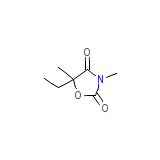Paradione




Paradione Brand names, Paradione Analogs
Paradione Brand Names Mixture
- No information avaliable
Paradione Chemical_Formula
C7H11NO3
Paradione RX_link
No information avaliable
Paradione fda sheet
Paradione msds (material safety sheet)
Paradione Synthesis Reference
No information avaliable
Paradione Molecular Weight
157.167 g/mol
Paradione Melting Point
101.5 oC (boiling point)
Paradione H2O Solubility
8.4 mg/mL
Paradione State
Liquid
Paradione LogP
0.763
Paradione Dosage Forms
Tablet
Paradione Indication
Used for the control of absence (petit mal) seizures that are refractory to treatment with other medications.
Paradione Pharmacology
Paramethadione is an oxazolidinedione anticonvulsant similar to trimethadione that acts on the central nervous system (CNS) to reduce the number of absence seizures (often seen in epileptics). Absence seizures involve an interruption to consciousness where the person experiencing the seizure seems to become vacant and unresponsive for a short period of time (usually up to 30 seconds). Paramethadione acts on thalamic neurons in the thalamic reticular nucleus (which studies have shown to be associated with absence seizures, von Krosigk et al., 1993).
Paradione Absorption
Rapid via the digestive tract.
Paradione side effects and Toxicity
Symptoms of overdose include clumsiness or unsteadiness, coma, severe dizziness, severe drowsiness, severe nausea, and problems with vision.
Paradione Patient Information
Dione anticonvulsants are used to control certain types of seizures in the treatment of epilepsy. They act on the central nervous system (CNS) to reduce the number of seizures. These medicines cannot cure epilepsy and will only work to control seizures for as long as you continue to take them.
Paradione Organisms Affected
Humans and other mammals














